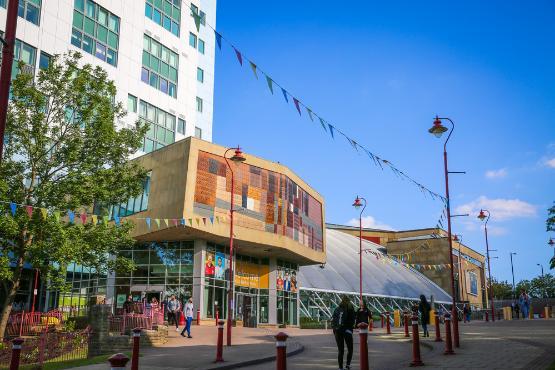Public Health and Community Wellbeing - A vital course to support society says new Programme Leader Dr Imose Itua

New Programme Leader for our Public Health and Community Wellbeing course, Dr Imose Itua has spoken about how important the skills gained on the course are to society: "The course is more relevant now than ever. In light of the enormous changes to public health over the last two years and with the pandemic slowly phasing out, "public health and community wellbeing” is vital for many reasons, not least mental health pressures, the cost of living crisis, the need to support healthier lifestyle and of course the need for preparedness for emerging and re-emerging infectious disease. The prevalence of infectious disease and non-communicable disease has increased in the past few years and outcomes have worsened due to the pandemic.”
The National Student Survey scores the Public Health and Community Wellbeing course highly for learning opportunity and overall student satisfaction, with a score of 88 and students in the last academic year secured professional roles after their work-placement (even before graduation) with organisations such as Horton Housing, the Human Relief Foundation, National Citizen Service, and mental health charity Mind. Imose remarks: “There is no better time than now to be studying public health and looking to make a real and lasting difference to population health at local, community and national level"
Imose works with a team of academics and researchers in the Faculty of Health Studies with backgrounds in nursing, social work, sociology, health systems development, policy and politics, epidemiology, community development, psychology and counselling, and with the phasing out of the pandemic and the associated restrictions, she is keen to emphasise the broad range of support needed: “It is unclear how people have been affected by lockdown but there is already some indication that mental health, health inequalities and cost of living crisis leading to poverty are key areas that will require support and intervention over the coming years from workers with specialised skills. Public health workers need to think of creative and innovative ways to address these crises and lessen the negative impact on the population.
“Not only do we prepare students for handling the kind of public health crisis we are now seeing unfold, we equip students to work with communities to tackle the broad range of factors that affect health and wellbeing. These factors can include unemployment, housing and homelessness, income inequalities and debt, as well as environmental factors like air pollution”.
To prepare students for future employment, all students complete a work-based placement during the 2nd year of the course. The placement takes place in semester 1 of the 2nd year and is 100 hours, which is around 14 days. Our students have opportunities to complete a placement within various organisations in West Yorkshire including Horton Housing, Bevan House and can take up research opportunities within Bradford Dementia Hub, Born in Bradford projects and the University Digital Health Zone.
Imose talks about the diversity of career paths open to graduates of the course: “There is such a variety of careers that follow on from our course: we have had graduates who become health researchers, work with Public Health England, the NCS, with destitute asylum seekers, supporting people with mental health issues, diverse communities, and who go on to form the next generation of managers and leaders in health and social care. The consequences of Covid-19 will be with us for years to come and there has never been a greater demand for the skills and knowledge that this degree provides”.
You can read more about our programme at: https://www.bradford.ac.uk/courses/ug/public-health-community-wellbeing-bsc/
For an informal chat about the course, contact Imose Itua (Programme Leader) on i.itua@bradford.ac.uk or Andrew Hart on a.hart1@bradford.ac.uk
